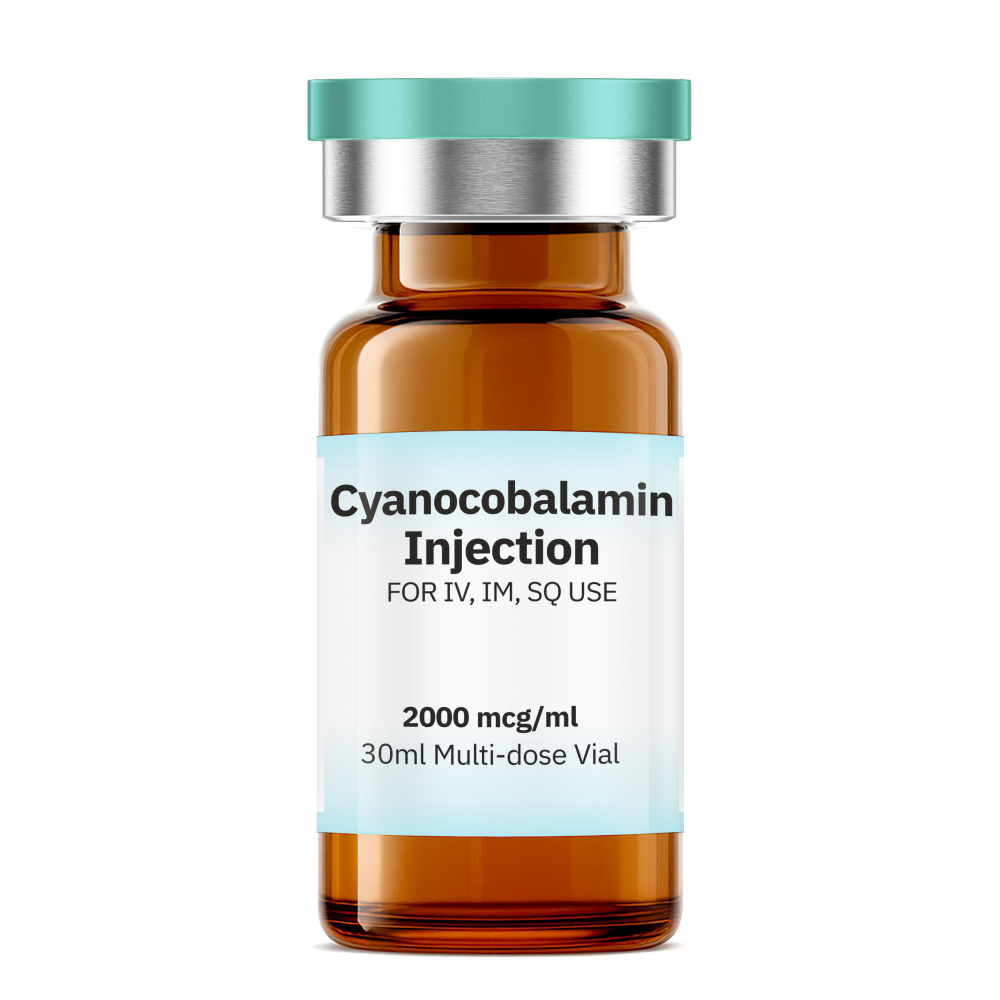
Cyanocobalamin 2mg/ml(B12)
Cyanocobalamin is a vitamin of the B-complex family, commonly known as cobalamins. It is a synthetic or man-made form of vitamin B12 . Cyanocobalamin is the most common form of the cobalamins used in nutritional supplements and fortified foods. It contains a cyano (cyanide) group in its structure, which makes it more stable than other forms of vitamin B12 as the cyanide stabilizes the molecule [1][2].
Cyanocobalamin is a vital compound for cell division and growth, hematopoiesis, and nucleoprotein and myelin synthesis. This vitamin also has an important role in protein synthesis, neural metabolism, DNA and RNA production, as well as fat and carbohydrate metabolism. Several cells appear to have the greatest demand for cyanocobalamin, particularly those that undergo rapid division such as bone marrow and epithelial cells [3][4].
Available to ship to your site 3-4 weeks after ordered
-
30mL
-
2mg/ml
Cyanocobalamin is a synthetic form of vitamin B12, commonly used to treat and prevent vitamin B12 deficiency. It’s often administered via injection, either into a muscle or under the skin [4][5]. -
Vitamin B12 serves as a cofactor for methionine synthase and L-methylmalonyl-CoA mutase enzymes. Methionine synthase is essential for the synthesis of purines and pyrimidines that form DNA. L-methylmalonyl-CoA mutase converts L-methylmalonyl-CoA to succinyl-CoA in the degradation of propionate, an important reaction required for both fat and protein metabolism. It is a lack of vitamin B12 cofactor in the above reaction and the resulting accumulation of methylmalonyl CoA that is believed to be responsible for the neurological manifestations of B12 deficiency [3]. Succinyl-CoA is also necessary for the synthesis of hemoglobin.
-
You should not use cyanocobalamin if you are allergic to vitamin B12, cobalamin, or cobalt.
Ask a doctor, pharmacist, or other healthcare provider if it is safe for you to use this product if you have ever had:
any condition that makes it hard for your body to absorb nutrients from food (malabsorption);
cancer; or if you use a blood thinner (such as warfarin). -
Drug Interactions
Chloramphenicol: This antibiotic can interfere with the effectiveness of cyanocobalamin in treating anemia [6].
Proton Pump Inhibitors (PPIs): Medications like omeprazole and lansoprazole can reduce the absorption of cyanocobalamin [4].
H2 Receptor Antagonists: Drugs such as ranitidine and famotidine may also decrease cyanocobalamin absorption [4].
Metformin: Long-term use of this diabetes medication can lower Vitamin B12 levels [4]. -
Vitamin B12 is known to be non-toxic even in high doses. The reported adverse reactions following parenteral administration of vitamin B12 include:
Generalized: Anaphylaxis and death
Cardiovascular: Pulmonary edema and congestive cardiac/heart failure during early treatment; peripheral vascular thrombosis
Hematological: Polycythemia vera (a rare type of blood cancer)
Gastrointestinal: Mild, transient diarrhea
Dermatological: Itching; transitory exanthema (widespread skin rash)
Miscellaneous: Feeling of swelling of entire body -
Cyanocobalamin is a medication of the FDA pregnancy category C. Up to now, no adequate and well-controlled reproduction studies have been conducted in humans and animals to determine its effects on pregnant women [2]. However, there is also no reports of maternal or fetal harms with the ingestion of normal daily recommended amounts during pregnancy. In fact, the requirements for vitamin B12 increase during pregnancy. Therefore, parenteral cyanocobalamin should be administered to a pregnant woman if the benefits outweigh the risks [1][2].
Cyanocobalamin is excreted in the breast milk of nursing women in levels similar to the level of vitamin B12 in maternal plasma [2]. The distributed cyanocobalamin in breast milk has been found to be compatible with breastfeeding by the American Academy of Pediatrics [2]. In addition, there has not been any reports of adverse effects associated with the intake of normal daily requirements of vitamin B12 during lactation. The Food and Nutrition Board, the National Academy of Sciences-National Research Council recommend that lactating women should consume 4 mcg of vitamin B12 daily [3].
-
Store this medication at 68°F to 77°F (20°C to 25°C) and away from heat, moisture and light. Keep all medicine out of the reach of children. Throw away any unused medicine after the beyond use date. Do not flush unused medications or pour down a sink or drain.
-
1. Markle HV, Greenway DC. Cobalamin. Critical reviews in clinical laboratory sciences. 1996; 33: 247-356.
2. Herrmann W, Obeid R. Cobalamin deficiency. Subcell Biochem. 2012; 56: 301-322.
3. Paul C, Brady DM. Comparative Bioavailability and Utilization of Particular Forms of B12 Supplements With Potential to Mitigate B12-related Genetic Polymorphisms. Integrative Medicine: A Clinician’s Journal. 2017; 16: 42–49.
4. drugs.com 5. webmd.com 6. rxlist.com


